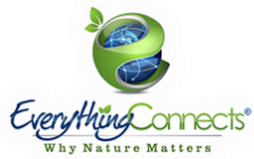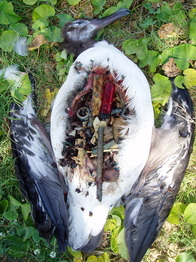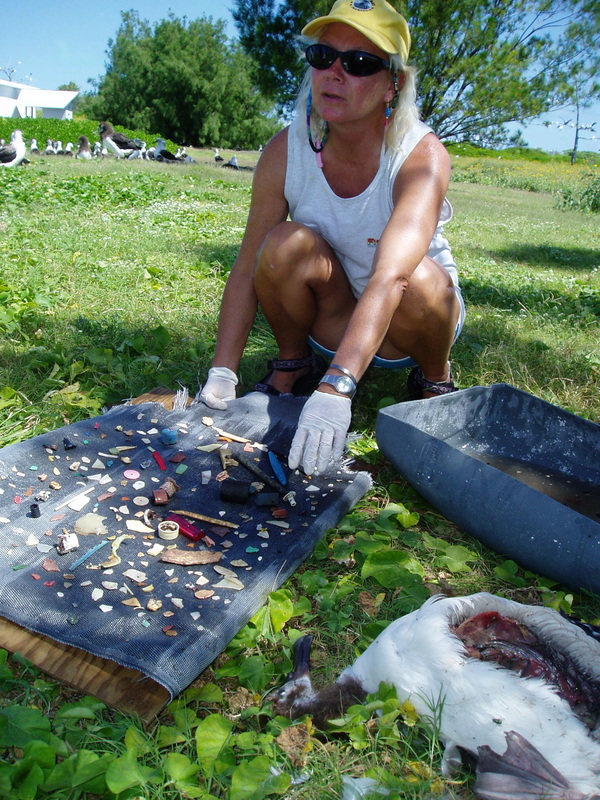End Plastic Pollution
|
Navigation
|
Ending plastic pollution is about avoiding plastic in the first place and if unable to, reusing or recycling the material as opposed to tossing it into the garbage towards the landfill or onto the ground embarking it upon a journey to the sea. Plastics do not biodegrade, but will eventually break down into smaller particles from exposure to the elements, lasting virtually forever. These small particles resemble food to marine life with tragic results. However, it does not stop there. Ingested plastic particles are transferred up the food chain and come back to us in the form of toxic food. Plastic constitutes 90% of all trash circulating in the world's oceans with some areas having a ratio of 6-to-1 plastic to plankton by weight in 1999 and 46-to-1 plastic to plankton ratio in 2008. The world produces 300 billion pounds of plastic each year. 10% of this plastic ends up in the oceans where much of it eventually sinks damaging habitats on the ocean floor. The rest remains suspended just below the ocean surface circulating in ocean gyres or washing up on a distant shore. There is little we can do to clean our oceans, for a cleanup effort would bankrupt any country, but there is much we can do to change our ways to prevent further destruction both in the ocean and on land. The best solution is prevention. Discover 16 Ways to Reuse Plastic Bags.
|
Why Avoid Plastic?
|
|
"We live on one planet, we have one ocean. Even though we call this one ocean different names it is all connected. We have to look after the ocean and not dump plastic in it thinking it will disappear - as it won't. Everyone will be affected by plastic polluting the ocean - we're going to be swimming in it, surfing in it and ingesting chemicals from the plastic which accumulated through the marine food chain. I don't want to swim in water that's a garbage dump and I'm sure many other people don't either. ~ Suzanne Frazer, Co-Founder, Beach Environmental Awareness Campaign Hawai'i (B.E.A.C.H.)
|
|
The Plastic Pollution Coalition Invites you to Take The Pledge and Follow the 4 R's of Sustainable Living
|
Refuse
Simply say NO to single-use and disposable plastics, such as bags, bottles, straws, cups, plates, silverware and razors! Discover alternatives. This is the most effective of the 4r's and will allow you to discover that life without disposable plastics is not only entirely feasible, but also healthier! Learn more. |
Reduce
Reduce your plastic footprint entirely by avoiding plastic in the first place or by buying in bulk, choosing products with the least packaging and amount of disposable parts, purchasing vegetables and legumes without prepackaging, looking for products and packaging made from renewable resources, and avoiding plastic packaging and containers. |
Reuse
Reuse preferably nontoxic, such as glass or stainless steel, containers and goods to make less waste. If you have plastic bags or containers, reuse them as well to prolong their life before recycling them. |
Recycle
Recycle what you can’t refuse, reduce or reuse. Recycling plastic has many benefits, but is a last option because it uses energy, there may not be a market for the refabricated, usually less useful materials, the waste may be shipped overseas where it isn't recycled, but burned causing toxic emissions, and most plastics aren't actually recycled, but downcycled. Learn more. |
"Everyone, no matter how close to or far from the ocean, can contribute to the solution. It’s simple: Reduce, Reuse, and Recycle - (1) Try to reduce the amount of trash you produce (e.g., try to purchase items with minimal additional packaging); (2) Make use of items that are reusable rather than disposable; and (3) when you do use disposable items, remember to recycle!" ~NOAA
|
|
|
Explore, join and support these organizations working hard to spread awareness on the environmental and health impacts of plastic pollution and marine debris and what we can do to stop it in our communities, around the world, in the stomachs of wildlife and within our own bodies!
*Be sure to search out your local organization!
|
Save My Oceans: The Oceans Hot or Not List
Your browser does not support viewing this document. Click here to download the document.
Purchase Compostable and Reusable Items:
"Walk into any grocery or department store and try to fill a grocery cart with individual products that are not made from, packaged, or labeled with plastic. Though some products, like plastic bottles, have a recovery plan, most do not. Even fewer are truly recycled. Plastic lost at sea is an environmental and potential human health hazard. We must demand zero tolerance for plastic pollution. Reducing our consumption and production of plastic waste, and choosing cost-effective alternatives will go a long way towards protecting our seas- and ultimately ourselves." ~5 Gyres |
"In 2010, a California grey whale washed up dead on the shores of the Puget Sound. Autopsies indicated that its stomach contained a pair of pants and a golf ball, more than 20 plastic bags, small towels, duct tape and surgical gloves." ~Clean Water Action
|
|
Go The Extra Mile!
|
Educate Others
Any chance you get, educate others about the suggestions listed above and how plastics are dangerous. Whenever you can, set an example by being a conscious consumer, avoiding plastic, picking up litter in your community, holding onto your items longer and reusing potential waste. People will catch on even if it takes a while and you'll be educating with a powerful combination - your actions and words! |
Take Responsibility
Whether you represent yourself or a business, know how much you or your organization is contributing to the problem of plastic pollution by conducting a waste audit and sharing the information and by setting specific goals to reduce or eliminate your plastic waste generation. This can save you money, give your organization a boost in public perception and put you on the path to living greener. |
Join a Beach Clean-Up
Many organizations host clean-up days where you can volunteer to pick up trash at your local beach or by participating in Ocean Conservancy’s International Coastal Cleanup. A few hours of your time can make a big difference and even lead to making new friends and connections. Furthermore, you can pick up trash along the roadways, in parks and around your community or as the opportunity presents itself to you. Start Your Own Local International Coastal Cleanup Event! |
Reduce or Ban Plastic Bags
What we do as individuals matters and adds up. What our laws tell us to do as a society matters even more. Get involved with legislation and join the many cities, states and countries across the globe that have passed laws to reduce or ban plastic bags. Start locally or go globally. Bans and fees on disposable plastics are working to protect people and the environment worldwide. Learn more. |
|
|
"Plastic pollution affects every waterway, sea and ocean in the world. When we damage our water systems, we're putting our own well-being at risk. Floating plastic particles look like food to many marine species – including the fish that we eat. Compounds found in some plastics have been linked to cancer and hormone disruption. Back on the shore, the garbage that washes up on our beaches is much more than an eyesore: it can be dangerous to animals and children, and cost millions of dollars in cleanup costs and loss of tourism. The most effective way to stop plastic pollution in our oceans is to make sure it never reaches the water in the first place. By using better waste management practices, individuals, companies, and governments can all make a big impact" ~Natural Resources Defense Council, Plastic Pollution in Our Oceans |
|
|
Last Revised: 11/20/13
Commenting Rules |




